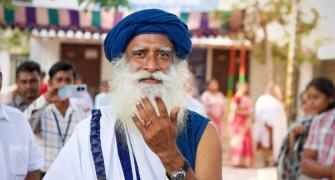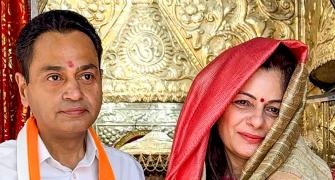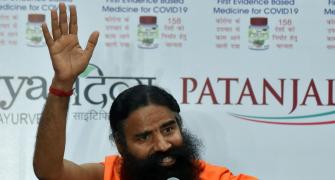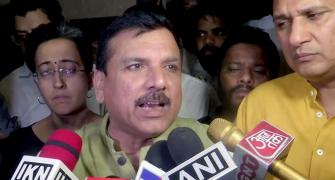Leader of Bharatiya Janata Party Lal Kishenchand Advani may stir a few controversies as his current views and the series of interviews he has given in the past will be launched as a book on Saturday at the World Book Fair in Pragati Maidan, New Delhi.
In the book 27 years. Journey of Mind: Vichar Yatra, he has said that the Communist party should prove their loyalty to India.
The book is a collection of interviews given by him to Tarun Vijay, editor of Panchjanya, during the past 27 years where Advani has spoken on a variety of issues.
In one interview given in 1988, he has said that the Communists could never unshackle themselves from Moscow's (diktats).
"Their basic commitments are always suspect. They don't consider this nation as one entity, but a conglomeration of various nationalities. Their assertion is that this is not a multi-state nation, but a multi-nation state. Initially they had listed 12 nationalities on the basis of languages. They had even advocated their right to secede from the Centre. They supported India's Partition and the creation of Pakistan," Advani said.
Advani said that at the international level the Communists had passed resolutions against India's Independence. "They had abused Netaji Subhash Chandra Bose as a 'lackey of Tojo'. Can one forget these facts? Can India, our Constitution, establishment and democracy remain safe in the hands of such elements?" Advani asked.
Tarun Vijay did his first interview with Advani in February 1980, which was published in Panchjanya.
In the interview, Advani had advocated a two-party system for the country.
"We are most suitable for a two-party democracy that helps a pan-national outlook and strengthens national unity," Advani had advocated.
In 1980 Advani was not at all known outside the saffron crowd. He was more like a professor in a political department than a mass leader. The turning point in his life was the Ramjanmabhoomi movement, which converted the 'professor' into a mass leader.
This month Advani has been accepted and endorsed as a consensual prime ministerial candidate of the National Democratic Alliance.
In one of the interviews, he has the compared kar sevaks of December 6, 1992, with the naval mutineers of the freedom struggle.
He is candid on Pakistan President Pervez Musharraf too. "I don't trust Pervez. I trust in my policy's efficacy (against terrorism)."
Advani claims and believes that "Hindu interest is synonymous with the national interest" and "Ramjanmabhumi temple should be built to give a fillip to national rejuvenation."
While commenting on his party he said in an interview given in 1980 that "the BJP is not an ideological party, but a party based on idealism."
Advani was for saying so. However, in 1991 he accepted the supremacy of ideology in no uncertain terms.
While commenting on the BJP's 'Hindu image' he said, "The more Congress and other parties encourage minorityism, in the same proportion Hindus have begun to believe that they are subjected to injustices only because they are Hindus. The BJP has said and will continue to say that we do not accept this kind of pseudo-secularism."
While talking about the Hindu vote bank he said that, "I would say though it would be a better position than voting on the basis of caste or parochialism, yet my clear view on this is that people should vote only on the basis of national interest. Any tendency to cast votes on the basis of religion, caste or parochialism harms the nation -- whether this tendency is in a Hindu or in a Muslim or a Christian --- we are against it."
When questioned if the present polarised atmosphere will help a Hindu revival or rejuvenation, Advani said, "To the extent we are able to prove that Hindutva means establishing an exploitation free modern society, it will be called a Hindu renaissance and to the extent we are unable to that, somebody may call it a mere Hindu revivalist movement. But our intention is to have a real Hindu rise, a Hindu neo-renaissance which is all inclusive. The nation's interest lies in this very Hindu neo-renaissance."
Although Advani is satisfied with his own political journey that started when he was 14 when he came in contact with the Rashtriya Swayamsevak Sangh, he says he has one major regret. "To see that though we as a nation had immense possibilities, yet we have not been able to realise them fully. The nation has not progressed to the extent it could have. But at the same time I have firm belief that in the present century, we will realise the dream of Bharat's Param Vaibhav (Motherland's supreme glory -- the term Param Vaibhav is used in the daily prayer of the RSS)."







